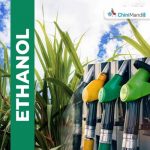Mumbai, December 16, 2020: Godavari Biorefinery Ltd., one of the pioneers in the manufacture of alcohol-based chemicals in India has increased its ethanol manufacturing capacity from 320,000 liters per day to 400,000 litres ethyl alcohol per day. The company is targeting to divert 40% of its sugar in cane to make ethanol using sugarcane juice and B Heavy molasses. With this development, the company will have a capacity of over 100 million liters of ethyl alcohol in a single location.
Sugar, a low carbon source of energy, is not just an environmentally friendly source to produce ethanol but also drives the rural economy. The livelihood of a significant number of small farmers in rural India depends on the farming of sugarcane, production of Ethanol using sugar will support the growth of such farmers.
Samir Somaiya, Chairman and Managing Director, Godavari Biorefineries Limited, said, “Since the inception of the company, we have worked towards building an environmentally friendly eco-system in our company. With the increase in capacity of production of Ethanol, we are not only growing our business but also helping the entire ecosystem flourish.”
While the world is moving towards sustainable practices to reduce carbon footprints, governments all over the world are promoting policies/programs to encourage companies/industries to incorporate green practices. One of such programs introduced by the Indian government is the Ethanol Blending Program, which sought to promote the use of alternative and environment-friendly fuels and to reduce import dependency for energy requirements. The Government expanded the size of this programme by allowing the use of sugarcane juice/syrup and more recently other feedstocks.
Godavari Biorefineries Ltd., one of the first companies to associate with the expanded program and supplied a large quantity of ethanol to the Ethanol Blending Program last year. Earlier this year, the company delivered 38 million liters of ethanol to the program. Godavari Biorefineries pioneered the use of sugarcane syrup for making ethanol by diverting almost 30% of sugarcane directly following the Brazilian model. This year, the company is contracting to deliver more than 70 million litres for the ethanol blending programme. In the future, the company plans to produce more than 100 million litres in a single location.












